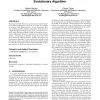Free Online Productivity Tools
i2Speak
i2Symbol
i2OCR
iTex2Img
iWeb2Print
iWeb2Shot
i2Type
iPdf2Split
iPdf2Merge
i2Bopomofo
i2Arabic
i2Style
i2Image
i2PDF
iLatex2Rtf
Sci2ools
GECCO
2007
Springer
2007
Springer
Discrimination of metabolic flux profiles using a hybrid evolutionary algorithm
Studying metabolic fluxes is a crucial aspect of understanding biological phenotypes. However, it is often not possible to measure these fluxes directly. As an alternative, fluxome profiling provides indirect information about fluxes in a high-throughput setting. In this paper, we consider a scenario where fluxome profiling is used to investigate characteristic differences between a number of bacterial mutant strains. The goal is to identify groups of mutants that show maximally different fluxome profiles. We propose an evolutionary algorithm for this optimization problem and demonstrate that it outperforms alternative methods based on principle component analysis and independent component analysis on both real and synthetic data sets. Categories and Subject Descriptors I.2 [Artificial Intelligence]: Miscellaneous General Terms Algorithms Keywords Evolutionary Algorithm, Biological Application, Fluxome Analysis
| Added | 16 Aug 2010 |
| Updated | 16 Aug 2010 |
| Type | Conference |
| Year | 2007 |
| Where | GECCO |
| Authors | Stefan Bleuler, Eckart Zitzler |
Comments (0)

